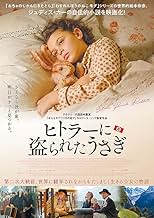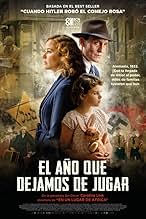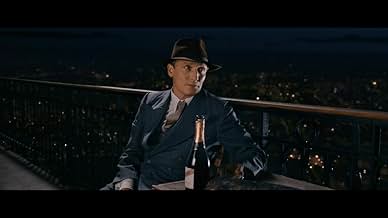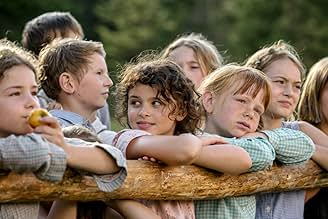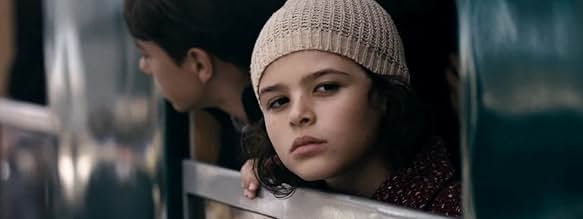IMDb-BEWERTUNG
7,0/10
3660
IHRE BEWERTUNG
Eine jüdische Familie musste vor den Nazis aus Berlin fliehen. Zuerst fliehen sie nach Zürich. Von dort geht es nach Paris und schließlich nach London.Eine jüdische Familie musste vor den Nazis aus Berlin fliehen. Zuerst fliehen sie nach Zürich. Von dort geht es nach Paris und schließlich nach London.Eine jüdische Familie musste vor den Nazis aus Berlin fliehen. Zuerst fliehen sie nach Zürich. Von dort geht es nach Paris und schließlich nach London.
- Auszeichnungen
- 5 Gewinne & 5 Nominierungen insgesamt
Empfohlene Bewertungen
Completely based on true events, this movie shows how a jewish family was able to just barely escape germany, thereby preventing being locked up in a concentration camp and facing a certain death.
What makes this movie very relevant is that it shows the way the jewish family was received by people in the places and countries they fled to. To think that it was only the nazi germans that discriminated and blamed the jewish people during the 1930's, is shown to be a wrong assumption.
It is very interesting to see this story being told by what the youngest daughter of the family experieced. I think the title is a good example of what decisions this girl had to take and how she personally saw those decisions: e.g. "why can't I take my favorite pluche rabbit?".
Considering that it is not easy to produce a movie that has as a small child in the main role, I think the result is excellent. The cinematography, vehicles, clothing and sets were all of such high quality that you really deem yourself in the 1930's.
Concluding, I think this movie deserves a score of 8.1/10, thereby easily making an 8-star IMDb rating. If you decide to watch this movie, I also recommend that you search the internet on what happened with the family after the war ended: I guarantee that you will surprised and/or impressed by all the achievements.
What makes this movie very relevant is that it shows the way the jewish family was received by people in the places and countries they fled to. To think that it was only the nazi germans that discriminated and blamed the jewish people during the 1930's, is shown to be a wrong assumption.
It is very interesting to see this story being told by what the youngest daughter of the family experieced. I think the title is a good example of what decisions this girl had to take and how she personally saw those decisions: e.g. "why can't I take my favorite pluche rabbit?".
Considering that it is not easy to produce a movie that has as a small child in the main role, I think the result is excellent. The cinematography, vehicles, clothing and sets were all of such high quality that you really deem yourself in the 1930's.
Concluding, I think this movie deserves a score of 8.1/10, thereby easily making an 8-star IMDb rating. If you decide to watch this movie, I also recommend that you search the internet on what happened with the family after the war ended: I guarantee that you will surprised and/or impressed by all the achievements.
Cinematography is excellent in the movie. Colors look stunning on a bluray. Coming to the movie it's just average. Child actor is good though
The movie shows, from the perspective of a child, the story of a jewish family fleeing in Europe looking for opportunity after escaping from Hitler.
The scenery is nicely made, nice shots in the alps, nice rooms. The script is well written, but they could have worked better on small details, such as dialogue/foreshadowing. They expect that the viewer might not catch everything that is going on, so they try to explain it with dialogue, which feels artificial sometimes. As an example, the girl cares throughout the whole movie about the lost rabbit, though she's never seen playing with such toys: they had to explain over and over the movie's title.
They cared too much into making the "good" characters look pretty and the "evil" characters look bad. In one scene in which the girl's mother complain about having a bad hair while her hair was clearly made to look pretty (she looks/is 20 years younger than her husband). Meanwhile the characters which are not friends of the family are always portrayed with strange looks.
The humor is good, though you might need to speak some German to fully understand it.
It's a good movie, though some small details could have been made with more thought. 8/10
The scenery is nicely made, nice shots in the alps, nice rooms. The script is well written, but they could have worked better on small details, such as dialogue/foreshadowing. They expect that the viewer might not catch everything that is going on, so they try to explain it with dialogue, which feels artificial sometimes. As an example, the girl cares throughout the whole movie about the lost rabbit, though she's never seen playing with such toys: they had to explain over and over the movie's title.
They cared too much into making the "good" characters look pretty and the "evil" characters look bad. In one scene in which the girl's mother complain about having a bad hair while her hair was clearly made to look pretty (she looks/is 20 years younger than her husband). Meanwhile the characters which are not friends of the family are always portrayed with strange looks.
The humor is good, though you might need to speak some German to fully understand it.
It's a good movie, though some small details could have been made with more thought. 8/10
Watched this flick today with my 13 year old daughter.
The lead actor girl - she is just so brilliant, and also extremely adorable. No words for this sweet little girl. She IS Anna, with all her heart and soul.
Whole cast is wonderful, they all CAN act.
And hats off to the script - it's just great, the situations are coming right out of daily life of a young refugee girl - all the dialogues are real, not that kind of "young kid actor are talkin like 20 year old adult" - we know from US movies. The kids here are taken seroiusly as kids, and sometimes they are just so sweet and sometimes just so sad - I guess Carline Link knows what it's all about to be a kid, and how to script it and how to make them acting "in role" in front of the camera.
The whole story developes into a unique mix of drama and light entertaining - C. Link balances on the edge, and she manages not to fall off. Throughout the film, you can grab the historic background of forced jewish emigration out of Third Reich. But Link manages to let us be part of the family Kramer, to explore, what love in those hard times can mean. The true love parents are giving to their kids, whatever it costs, and the true love the kids give back. And it's even about the love between the parents, between sister and brother, and the love to their beloved uncle and to their beloved maid. You see, there was a lot of love to handle with - and Link was able to put this into an emotional, sometimes funny, sometimes heartbreaking gem.
Hitler murdered so many jewish people - but he couldn't destroy family Kerr (the original family, this film shows their lives, it's based on real events), God thank Judith Kerr for writing the original book 1971.
Go and see it with your family - you will smile, laugh, and maybe shed a tear sometimes. And that is what a good film should do.
Watch it only if you have nothing other to do.
It is slow paced but a beautiful movie set before Hitler took the power in Nazi Germany.
A true story about a Jewish family who escaped from their origin home. Nice places are shown here.
The children and the main actors made a very good job. Perhaps too long. 6/10.
It is slow paced but a beautiful movie set before Hitler took the power in Nazi Germany.
A true story about a Jewish family who escaped from their origin home. Nice places are shown here.
The children and the main actors made a very good job. Perhaps too long. 6/10.
WUSSTEST DU SCHON:
- Patzer(at around 48 mins) International long distance dialing wasn't introduced until the 1970s. When Heimpi calls Anna from Germany the line is automatically disconnected when she runs out of money. In reality, there would be an operator terminating the call.
- VerbindungenReferenced in Dear Werner (2020)
Top-Auswahl
Melde dich zum Bewerten an und greife auf die Watchlist für personalisierte Empfehlungen zu.
- How long is When Hitler Stole Pink Rabbit?Powered by Alexa
Details
- Erscheinungsdatum
- Herkunftsländer
- Offizielle Standorte
- Sprachen
- Auch bekannt als
- When Hitler Stole Pink Rabbit
- Drehorte
- Produktionsfirmen
- Weitere beteiligte Unternehmen bei IMDbPro anzeigen
Box Office
- Weltweiter Bruttoertrag
- 8.541.775 $
- Laufzeit1 Stunde 59 Minuten
- Farbe
- Seitenverhältnis
- 2.35 : 1
Zu dieser Seite beitragen
Bearbeitung vorschlagen oder fehlenden Inhalt hinzufügen

Oberste Lücke
What is the Canadian French language plot outline for Als Hitler das rosa Kaninchen stahl (2019)?
Antwort
![Trailer [OV] ansehen](https://m.media-amazon.com/images/M/MV5BZmIwMWQ1MTgtNDMwOS00NzAzLTgwMTMtZTg0NDBkMGZhODk0XkEyXkFqcGdeQXRyYW5zY29kZS13b3JrZmxvdw@@._V1_QL75_UX500_CR0)



